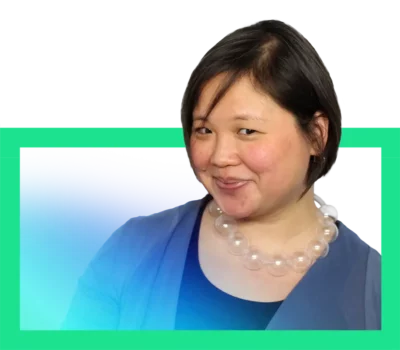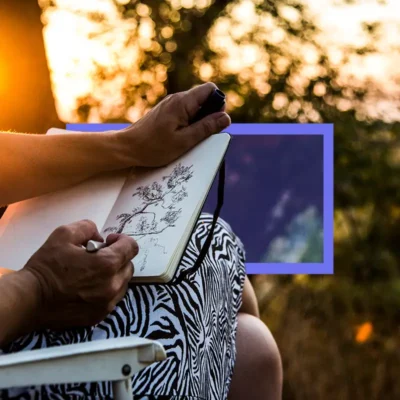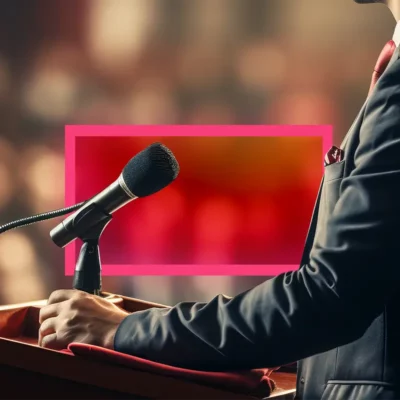That thing I’m missing is what makes me happy
When a years-long relationship ends, author and filmmaker Jennifer 8. Lee makes the startling discovery that she lacks an inner monologue – a voice inside articulating thoughts and feelings, reflecting on the past and planning for her future. At first she feels inadequate, as if she’s missing a “sense” that everyone has but her. But the more she talks with others, the more she wonders if its absence may just be a blessing in disguise. Photo credit: Newsgeist.


Table of Contents:
Transcript:
That thing I’m missing is what makes me happy
JENNIFER 8. LEE: It surprises me just how many people are sad, anxious and insecure, even those who on the surface have all the marks of success and confidence. What I seem to be missing may be precisely the thing that often makes other people unhappy. Maybe that’s my superpower.
ROHAN GUNATILLAKE: Jennifer 8 Lee is an author and journalist, a documentary filmmaker, entrepreneur, and self-described emoji activist. When a relationship she treasures comes to an abrupt end, Jenny discovers something extraordinary – she has no inner dialogue, the critic in our minds so many of us wrestle with day in and day out.
In this series, we combine immersive first-person stories and breathtaking music with the science-backed benefits of mindfulness practice. From WaitWhat and Thrive Global, this is Meditative Story. I’m Rohan, and I’ll be your guide.
The body relaxed. The body breathing. Your senses open. Your mind open. Meeting the world.
LEE: I step into our bright airy loft in New York City. It’s not yet nine am. Craig, my boyfriend, is sitting on the couch, wide awake. The subzero fridge hums in the open kitchen. This is not the time of day he tends to be up, especially on a holiday. He’s a programmer. Programmers stay up late and sleep in late. So I know immediately, something is wrong.
I walk quietly to the couch. Clearly, he’s upset. He wants to say something, but he can’t.
“Honey, what’s wrong?” More nothing.
So I start guessing. “Has someone died?” He shakes his head no. “Does someone have cancer?” Again, no.
“Do you wanna break up?” He nods – and then bursts into tears.
Craig is thin, slight, and right now he seems especially fragile. I try to calm him down, “Don’t worry. Everything’s going to be all right.”
But why am I the one trying to cheer him up? A years long relationship has just ended. Just now. By his doing. But he’s the one that’s crying. He’s emotional, but he’s also logical. So he presents me a list: the five reasons he’s breaking up with me.
Reason number one: I’m not empathetic enough. Reason number two: I’m not expressive enough. Reason number three: I’m not in touch with my emotions. Reason number four: I spend too much time on my devices – this, by the way, is totally true. Reason number five: I don’t laugh at his jokes.
But the first three: I’m not empathetic. I’m not expressive. I’m not in touch with my emotions. These all seem like basic traits that define us as humans. I failed at being human.
I’m a journalist. I communicate for a living. Craig’s a programmer. He works with computers for a living. And here I am being accused of an inability to communicate on a human level by the person most important in my life, a person who works with machines.
I’m not a Vulcan, living only with logic and no emotion. I’m warm and bubbly. I just don’t possess the desire to share feelings the way Craig seems to want me to. I have my little quirks, but I feel squarely in the realm of being a “normal” human.
Early in our relationship I asked Craig who he envied. Envy, I find, is a lens into what we care about, what matters to us most, even if we don’t consciously recognize it. I, for instance, envy people who make an impact, who launch global nonprofits, generate ideas that spread, build huge companies, perform life-saving surgeries, save refugees. Craig envies… happily married people.
Weeks after we start dating, he wants to see a relationship therapist. We sit in a small office on a nice couch, big enough so that couples can sit on either end – away from each other, but not too far away from each other.
She asks a battery of standard relationship questions, and we go through the hour – 50 minutes to be precise. Towards the end she asks, “How’s your sex life?”
We look at each other. We both say it’s great. That’s zero the issue. She pauses, her reaction is basically, “You’ll be fine.” It’s normal relationship stuff. Not anything that we need a counselor for.
So after therapy we take in what we learned, eating at one of his favorite Italian restaurants. Dinner is a tiny bit awkward. I feel vindicated, we passed! But in Craig’s eyes, we didn’t pass. I didn’t pass. He’s frustrated. He doesn’t think we’ve found the heart of the problem.
In retrospect, maybe Craig’s notion of intimacy is sharing your vulnerabilities and the kinds of thoughts that are internal, whatever it is that most people feel privately but hide behind the shiny happy faces that they show the world. And he believes strengthening our relationship means peeling that mask off.
But what if I don’t have a mask to peel?
He tries to dig in about how I feel, how I really feel. And I’m like, “I’m telling you how I really feel.” Happy, sad, grumpy, annoyed, frustrated. If my emotions are Crayola crayons, then I just have the basic set: red, blue, green. I just don’t have periwinkle in my set of emotions. And around and around we go. Either I have deep feelings and I’m not in touch with them, or I’m hiding them.
GUNATILLAKE: Jennifer is onto something. She can sense the limits of her emotional spectrum and that frustrates her. I’d like you to take a deep breath now. And as you exhale, notice where your mind goes, what thoughts come up for you. Now let them go. When we acknowledge our thoughts this way, we can create a distance between those thoughts and our attachment to them. It may unlock a new sense of freedom for you.
LEE: My friend Amy invites me to dinner. She’s in her 40s but learning to cook. She lives in a two-bedroom apartment in a doorman building on the Upper West Side, cozy and professional, lined with books. Tonight, she makes one of her favorite childhood dishes: chicken divan, with cream sauce, broccoli and bread crumbs.
So at dinner I tell Amy the story of my trip to Southeast Asia, the last trip I took with Craig before we broke up. Amy prompts me to share my feelings about the trip. I say , “Angkor Wat is amazing, the grandeur and complexity of this ancient civilization is mind blowing.” Amy reprimands me for offering what feels to her like a third person account: “You need to put an I in front of that!”
Amy says, “When you share vulnerable feelings in which you feel insecure, uncomfortable, and upset, your partner feels closer to you.”
Amy advises me the best way to show vulnerability is to vocalize what’s going on inside my head. My so called inner monologue. But I don’t seem to have one.
One day, I confess a silly mistake I made on a large group email thread at work, someone replies, “When you do that, do you call yourself Jenny Lee, or Jennifer 8. Lee in your inner monologue?” And I write back, “I don’t have an inner monologue.” Chaos ensues on the thread as more and more people chime in. To me, it’s like discovering that there is another sense – literally a seventh sense that everyone has but me.
We discover another person in the company also lacks one. So I’m not alone. We’re as baffled by those who possess one as they are of us.
GUNATILLAKE Do you have an inner monologue? My own experience is perhaps closer to Jennifer’s. What is yours like? And more importantly, what’s your relationship to the monologue like?
LEE: The more I talk to people, the more I realize I may be the one in the minority. Without self-doubt constantly whispering in my ear. It pops up, like an occasional dinner guest, but it is not a live-in roommate.
It surprises me just how many people are sad, anxious, and insecure, even those who on the surface have all the marks of success and confidence. What I seem to be missing may be precisely the thing that often makes other people unhappy.
Maybe that’s my superpower.
But maybe my superpower makes me a form of robot – or a Vulcan. My feelings don’t drown me in complexity, or regret.
I don’t have an inner monologue telling me that I’m unworthy, flawed or somehow broken. But others do, and maybe that’s what makes them more human. Is that worth the tradeoff? I honestly don’t know.
I’m easy going. I readily make new friends, I’m quick to make a joke, quicker to laugh. I throw a great party, I’m sought out for advice. On the other hand, I don’t dwell on feelings, insecurities, and past experiences. And, like everyone, I have my imbalances and sad moments too.
And while I lack an inner monologue, I also lack an outer mask. A shiny happy face, reflects a shiny happy me. What you see is what you get.
Rohan’s closing meditation
GUNATILLAKE: Jenny’s story takes me back to a month I spent training with an incredible meditation teacher in Myanmar formerly known as Burma, twelve years or so ago. It was a really magical time, and the style of meditation I learnt there came to mind a lot as I listened to Jenny.
The instruction in that meditation center was quite brilliant. Instead of making a big deal of what is happening in your awareness, the practice instead is to be more interested in your attitude, your relationship to what is happening. Whether you push things away, get caught up in things, or remain balanced.
In today’s story Jenny was very aware of her emotional life and there was pressure on her to reject what was happening and want to change it, her practice was to be ok with how her mind is. So that’s what we’ll explore together.
Whatever posture your body is in, letting it be comfortable, letting it be soft. And letting your breathing be however it is right now. No need to change it. If it’s short and shallow, knowing that it is short and shallow. If it’s long and deep, knowing that it is long and deep. Just letting things be however they are right now, allowing things to be just as they are.
Learning to allow your experience to be just how it is, and remain balanced, irrespective of what is happening, is a powerful skill, especially when faced with the more challenging parts of life. When we are faced with things that are difficult or painful, we tend to push them away. And while that is entirely natural, that pushing away, that rejection, that resistance can make it feel even more unpleasant. And so inspired by Jenny, in this meditation you’re going to see if you can let go of that rejection, that resistance and remain balanced.
Remaining balanced doesn’t mean you have to like everything that is happening, or that you have to pretend you do. It just means that you are willing to soften whatever struggle is present that doesn’t actually make things better, that only adds to your discomfort. So let’s give it a go.
It’s relatively easy to allow things which feel pleasant or ordinary. So let’s start there, seeing if you can notice any aspects of your experience which feel light or relaxed such as the relaxation of your jaw as you smile, the softness of your belly as you breathe, any stillness you can sense in the room around you.
And just allowing the simplicity of that experience to be as it is. Without adding anything on top. Not pushing away, not holding onto, present and balanced.
As I’ve said, remaining balanced gets more challenging when dealing with the difficult. So is there anything in your experience right now that is difficult in the body? Maybe tension. Maybe discomfort. In the mind? Maybe difficult thoughts. Maybe worry. Maybe self-criticism.
How are you meeting these difficult experiences? What is your attitude towards them? Are you pushing against them? Or is there balance? Allowing whatever is here – the pleasant, the ordinary, the difficult. Being with it. Breathing with it. At the balance point. Aware and allowing.
Wherever you are in your journey, there will always be things which are painful, difficult and challenging. The invitation of this meditation and of meditation in general is to be balanced, calm and aware in whatever situation you find yourself, relaxing any struggle with what is happening – allowing the difficult, allowing the lovely. Able to rest wherever we are, however things are.
Thank you and be well.





